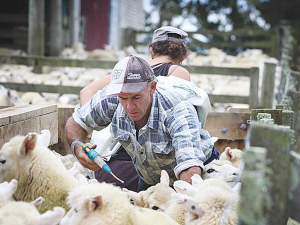Helping heifers grow
Dairy farmers can easily track the performance of their replacement heifers and ensure they reach their genetic potential.
 High levels of larvae intake or poor drench practice can result in animals having a parasite burden even when they have been drenched regularly.
High levels of larvae intake or poor drench practice can result in animals having a parasite burden even when they have been drenched regularly.
Following NZ's wettest July, according to NIWA, a laboratory analysing faecal egg counts (FEC) says this has led to record parasite numbers in sheep across the country.
Greg Mirams, managing director of Techion, which owns FECPAKG2 and runs a laboratory processing more than 30,000 FEC samples annually, says July’s weather conditions have led to record parasite burdens in livestock all over NZ.
“We have received counts of more than 3,000epg (eggs per gram) over the past eight weeks across the South Island, when their levels should be less than 300epg,” he says.
“In three instances we’ve analysed results from Southland hoggets that were tested at almost 3,500epg and recorded counts above 3,000 EPG on farms in Canterbury and Marlborough."
Meanwhile, the company has seen parasite burdens in hoggets from Hawkes Bay with counts of 2,100epg, while mobs in the Gisborne and Manawatu-Wanganui areas had counts of more than 1,200epg.
In general, sheep with FEC counts of more than 500epg will be under stress from parasites and will likely be suffering a drop in condition.
Mirams says while wet and challenging conditions over the past couple of months have had the biggest impact on the parasite challenge, other factors have also played their part. This includes the high levels of pasture contamination through the autumn.
He also cites feed availability; animals under nutritional pressure are more susceptible to parasites, as are stock that have to adjust to different types of winter feed.
“Many farmers believe drenching on a calendar schedule protects their animals from a parasite challenge. Furthermore, many think it’s unnecessary to drench in winter when grass growth is slowed,” Mirams explains.
“However, as these recent results prove, the parasite challenge continues through winter, particularly when conditions provide plenty of rain and temperatures which are a little warmer than traditional averages. The impact of climate change is directly reflected in the disease challenge to livestock.”
He claims that by FEC testing frequently throughout the year, farmers can catch the parasite burden before it impacts stock.
“Weight loss, slow weight gain and poor condition are all signs that stock are impacted by a high parasite challenge,” Mirams says.
“It is important to remember these signs may even occur when sheep have been regularly drenched and have adequate feed.”
He says that drench resistance, high levels of larvae intake or poor drench practice can result in animals having a parasite burden even when they have been drenched regularly.
“Therefore, it is vital to FEC test regularly throughout the year as well as follow-up testing after drenching to ensure that the drench is working effectively.”
The country’s 4200 commercial fruit and vegetable growers will vote from May 14 on a new HortNZ levy.
Meat processor Alliance Group is asking farmer shareholders to inject more capital in order to remain a 100% co-operative.
A vet is calling for all animals to be vaccinated against a new strain of leptospirosis (lepto) discovered on New Zealand dairy farms in recent years.
Dairy
Rural banker Rabobank is partnering with Food Rescue Kitchen on a new TV series which airs this weekend that aims to shine a light on the real and growing issues of food waste, food poverty and social isolation in New Zealand.
Telco infrastructure provider Chorus says that it believes all Kiwis – particularly those in the rural areas – need access to high-speed, reliable broadband.

OPINION: The new government has clearly signalled big cuts across the public service.
OPINION: Your canine crusader is not surprised by the recent news that New Zealand plant-based ‘fake meat’ business is in…